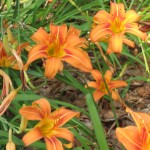
Old Orange
May 28th, 2009 | Posted in Miscellaneous by Anne Brewer
These daylilies are nothing to exclaim over by any means. In fact, the tawny Hemerocallis fulva is shunned by most daylily “snobs” because it is considered common. You find them along country roads and ditches, in cemeteries, and beside rural homes. And that’s exactly from where these came! My sister and I dug these up from an abandoned homesite that belonged to our ancestors a century ago. For me, where these came from is more significant than the “exoticism”, if you will, of the actual plant. Old Orange is a connection to my past and from whence I came.
Our family has a weekend house in the Alabama country where we spend alot of time. It is where my parents, grandparents, and great grandparents lived and died. Hence, my strong connection to this place called Boligee. I guess that’s what we call “having roots” means.
Anyway, my sister and I transplanted these daylilies years ago to our weekend home. A great mainstay for the southern summer garden, Old Orange-as I affectionately call this daylily- is heat and drought resistant, and very easy to grow. They have multiplied, and bloom profusely during the late spring and summer each year, providing a tangible reminder of my ancestors who gardened before me.
Tell me about your “roots”…
 Email This Post
|
Email This Post
|  Print This Post
Print This Post





Well, where do I start! I love to “rescue” flowers. My favorite finds were white spiderwort and white cypress vine. No need for an apology here, I think their color is very elegant, common or not.
“Good articles “
http://alexslawnandturf.com
Landscape Designing, Pest and Weed Control
Plants, Trees and Shrubs, Pond and Water Gardening, Power Equipment, Skin Products
That’s so special, love that you have those. My mom loves to plant roses and other flowers in memory of loved ones who have been lost and/or give a plant to people who have lost someone close to them to commemorate their life in the form of flowers. She also loves to transplant and do cuttings from friends, neighbors, and family.